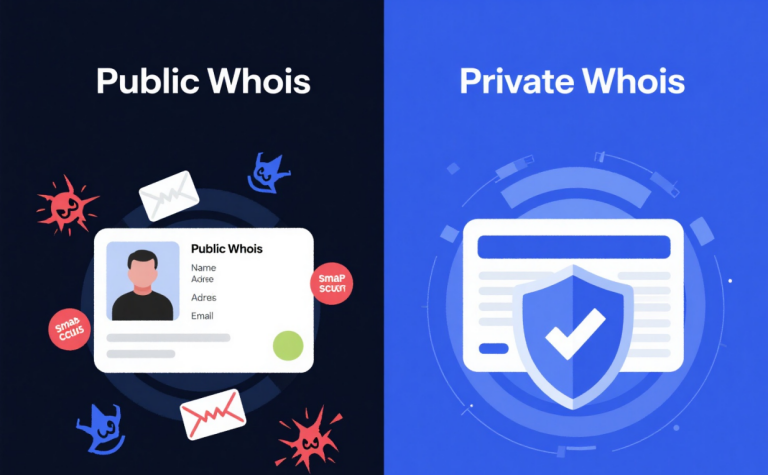
The moment you found the perfect domain name. After hours of brainstorming and searching, it was there: available. You rushed through the checkout process, entered your credit card details, and in a few clicks, it was yours. You felt a sense of pride and ownership. You had just claimed your own piece of digital real estate.
But in the flurry of that exciting moment, you probably scrolled right past the fine print. You agreed to a set of terms and conditions, established decades ago, for a version of the internet that no longer exists. And in doing so, you unknowingly agreed to a strange and unsettling bargain: in exchange for the ownership of your domain, you agreed to have your personal contact information published in a global, public phone book for the entire world to see.
I’m talking about your full name, your home or business address, your email address, and your phone number.
This isn’t a scare tactic; it’s a fact. It’s how the domain registration system was designed to work. This public phone book is called the Whois database. And if you haven't taken a crucial, simple step to protect yourself, your information is likely in it right now, completely exposed and available to anyone with an internet connection.
Today, we're going to pull back the curtain on this hidden corner of the internet. We’ll explore what the Whois system is, why it exists, and how its well-intentioned transparency has been weaponized by an army of spammers, scammers, and data miners. Most importantly, we will give you a clear, simple guide to reclaiming your privacy and erasing your name from this public directory for good.
Chapter 1: The Internet's Public Records Office - What is Whois and Why Does it Exist?
To understand the solution, we must first understand the problem. The Whois system wasn't born out of a malicious desire to expose people's data. It was created with the best of intentions in a much smaller, more innocent era of the internet.
The Analogy: The City’s Public Property Deed Office
Registering a Domain: Think of this as buying a plot of land in a new city.
The Whois Database: This is the city’s Public Records Office. By law, every single property transaction must be recorded here.
Your Whois Record: This is the official property deed for your plot of land.
The original purpose of this public record was accountability and problem-solving. In the early days of the internet, if a specific domain was causing a technical problem (like sending out spam or participating in an attack), other network engineers needed a way to find the responsible owner to contact them and get the problem fixed. The Whois record was that contact method. It was a phone book for the internet’s engineers.
What’s on Your “Deed”?
When you register a domain, you are required by ICANN (the global "zoning board" for domain names) to provide accurate contact information for the following roles:
Registrant: The legal owner of the domain.
Administrative Contact: The person authorized to manage the domain.
Technical Contact: The person responsible for the technical details.
For most individuals or small businesses, all three of these contacts are the same person: you. And the information published typically includes:
Your Full Name
Your Organization (if any)
Your Physical Street Address, City, State, and Postal Code
Your Country
Your Phone Number
Your Email Address
Go ahead, try it. Open a new tab and go to any Whois lookup tool. Type in a domain name you own (that doesn't have privacy protection). The results might shock you.
Chapter 2: The Open Invitation - The Real-World Risks of Public Whois Data
In that innocent era of the internet, this public phone book worked as intended. But in the modern world, this database has become a goldmine for those with less-than-noble intentions. It is a pre-vetted, globally accessible list of active website owners, and it’s being exploited every single second.
The Rogues' Gallery: Who is Abusing Your Data?
The Spammer and the Telemarketer: This is the most common and immediate consequence. Automated bots constantly scrape the Whois database to harvest millions of fresh, active email addresses and phone numbers. If you’ve ever registered a new domain and found your inbox suddenly flooded with unsolicited offers for “cheap SEO services” or “amazing web design,” this is why.
The Scammer and the Phisher: This is a more dangerous evolution. Scammers use the information in your Whois record to craft highly convincing, personalized phishing attacks. The most common scam is the fake domain renewal notice. You’ll receive an official-looking email, often using your real name and address, warning that your domain
yourdomain.comis about to expire and that you must click a link to pay an "urgent" renewal fee. The link, of course, leads to a fake payment page designed to steal your credit card information. Because they have your real data, these scams can be frighteningly effective.The Domain Hijacker: This is the stuff of nightmares. A sophisticated attacker can use the personal information on your Whois record—your name, address, phone number—as ammunition for a social engineering attack against your domain registrar’s own customer support team. They can call up support, pretend to be you, and use your public data to answer the security questions, with the ultimate goal of tricking the support agent into transferring control of your domain to them.
The Stalker and the Harasser: For anyone with a public profile—be it an activist, a journalist, a streamer, or just someone who has expressed a strong opinion online—having your personal contact information directly linked to your website can pose a real physical safety risk. The Whois database can become a tool for doxxing and harassment.
The Corporate Spy: Your competitors can easily monitor the domains you register. If you register a domain for a new, secret project, they might get an early warning about your business plans. They can also see all the domains registered by a single individual or company, giving them insight into your entire digital portfolio.
Chapter 3: The "Registered Agent" - How Whois Privacy Protection Works
So how do you take your name out of this public phone book without giving up your domain? The solution is elegant and simple. You use a service called Whois Privacy Protection.
The Analogy: The Privacy Trust for Your Property
When a celebrity or high-profile individual buys a house, they rarely put their own name on the public property deed. Instead, they use a legal entity—like a privacy trust or an LLC—and hire a law firm to act as their “registered agent.”
How it works: The public deed will list the name, address, and phone number of the law firm, not the celebrity’s. The law firm becomes the official point of contact. This shields the celebrity's personal information from public view.
The legal ownership: The celebrity still 100% owns the property. The law firm is just a legal proxy, a shield.
Whois Privacy Protection works in exactly the same way.
When you enable this service (which is offered by most good domain registrars, like Cloudflew), the provider will replace your personal contact information in the public Whois database with their own generic contact information.
Your record will no longer show:
John Smith
123 Main Street, Anytown, USA
john.smith@email.com
555-123-4567
Instead, it will show something like:
Privacy Department / WhoisProxy Service
500 Cloud Way, Internet City, USA
privacy.contact@your-registrar.com555-888-9999
But what about important emails?
This is a crucial point. The service doesn't just send your legitimate correspondence into a black hole. The email address they provide (privacy.contact@...) is a special forwarding address. The provider will receive any emails sent to it, filter out the obvious spam, and then securely forward the important, legitimate messages (like an official notice from the registrar or a legal inquiry) to your real, hidden email address. You remain reachable for critical matters, but you are completely invisible to the automated scrapers and spammers.
Chapter 4: The GDPR Effect and Modern Considerations
If you're in Europe, you might be thinking, "But isn't the GDPR supposed to protect me from this?"
Yes, it is. The EU’s General Data Protection Regulation has had a massive impact on the Whois system. For many domain registrations belonging to individuals within the EU, the registrar is now legally obligated to redact most of the personal information from the public record by default.
So, if you’re in the EU, are you in the clear? Not necessarily.
It’s not universal: These protections don’t always apply to all domain extensions (TLDs), especially some country-code TLDs (ccTLDs) that have their own rules.
It doesn't apply to businesses: The GDPR primarily protects the data of "natural persons." If you register a domain under your company name, your company address and contact information are often still made public.
It doesn't apply outside the EU: For anyone living outside the European Union, the old rules of public Whois data generally still apply.
For these reasons, even with the GDPR, explicitly enabling Whois Privacy Protection remains the most robust and universally effective way to ensure your information is shielded.
Registering your domain name is the exciting first step in building your online presence. But the very next step should be to protect it.
In an age where our personal data is constantly being harvested, analyzed, and exploited, leaving your name, address, email, and phone number in a globally accessible public database is an unnecessary and easily avoidable risk.
The small annual fee for a Whois Privacy service is not an upsell; it is one of the highest-value investments you can make in your own digital security and peace of mind. It’s the simple act of drawing a clear, bright line between your public brand and your private life. It's the difference between listing your personal home address on your company’s front door and simply listing the name of your trusted law firm. The choice, for any serious individual or business, should be obvious.

